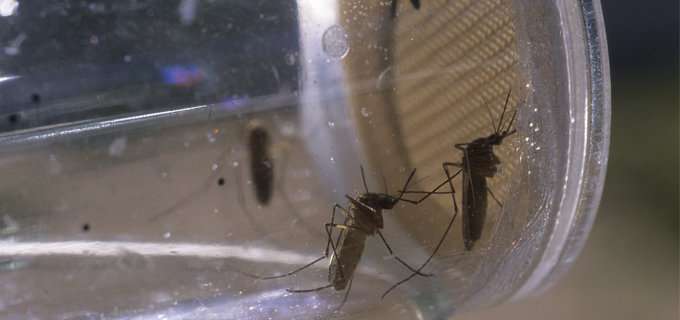Temperature affects insecticide efficacy against malaria vectors

Ambient temperature has a marked effect on the toxicity of the most commonly used insecticides for malaria control, according to a study led by ISGlobal. The results, published in the Malaria Journal, underline the need to evaluate the efficacy of these chemicals under real field conditions.
The appearance and spread of mosquitoes resistant to the insecticides currently used for malaria control is a threat to malaria elimination efforts. Pyrethoids are the only insecticide class approved for treating bed nets and used widely for indoor spraying. In Africa, resistance to pyrethroids has been reported. It is therefore crucial to monitor insecticide susceptibility or resistance among the main species of malaria-transmitting Anopheles. Insecticide efficacy is not only determined by the active ingredient, but also by other factors, including ambient temperature. However, susceptibility tests are normally performed in laboratories or insectaries where temperature conditions are optimal for the mosquito.
In this study, the researchers explored the effect of temperature on the standard insecticide resistance test using resistant or susceptible strains of two major malaria vectors, An. arabiensis and An. funestus. Toxicity of the pyrethroid deltamethrin and the carbamate bendiocarb was assessed at different temperatures (18, 25 or 30 degrees).
Results show that temperature impacts toxicity of both insecticides, but in a different way—bendiocarb lost efficacy at higher temperatures for both species whether they were resistant or susceptible. In contrast, higher temperatures decreased deltamethrin toxicity for susceptible arabiensis; the contrary was observed for resistant An. arabiensis and susceptible An. funestus. Piperonyl-butoxide (PBO), which inhibits pyrethroid-resistance mechanisms, completely restored deltamethrin susceptibility at all temperatures.
The authors conclude that caution must be exercised when drawing conclusions about a chemical's efficacy from laboratory assays performed at only one temperature. Temperatures in the field, they point out, can vary considerably during a single day.
"Performing efficacy tests with local vectors and under real field conditions (which would reflect the appropriate season and relevant time of day when chemicals are expected to act) would yield more accurate entomological intelligence for evidence-based decision-making," says ISGlobal researcher Krijn Paaijmans, who coordinated the study.
More information: Katey D. Glunt et al, The impact of temperature on insecticide toxicity against the malaria vectors Anopheles arabiensis and Anopheles funestus, Malaria Journal (2018). DOI: 10.1186/s12936-018-2250-4

















